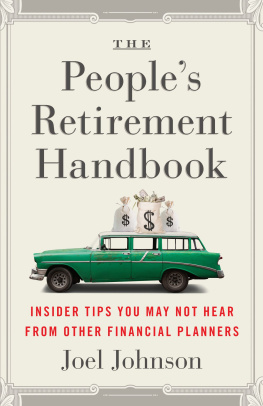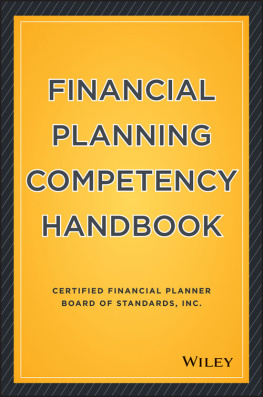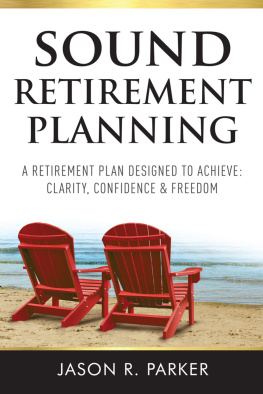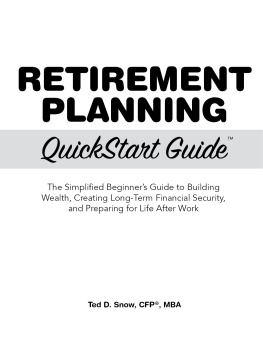This book is my opinion, based on my professional and personal observations.
Ive observed friends and acquaintances who were wealthy, others who never seemed to get ahead, and still others who were miserable.
The ideas and statements in this book are not absolutes; they do not apply to all who are wealthy or all who are struggling financially.
I am the majority owner in an investment advisory firm registered with the Securities and Exchange Commission, as well as the majority owner of an insurance agency.
Nothing in this book is a recommendation of an investment or a promise of future results. This books goal is to get you thinking about your thinking and behavior around money.
I want this book to help people improve their relationship with their finances. It is clearly not intended to recommend investment products or strategies, because as you well know, recommendations need to be customized to the individuals needs.
Introduction
When I was twenty - seven , I transitioned to the field of financial planning in 1989. My career move was partly a practical decision; my wife, Wendy, and I had been married for two years, and we were preparing to have a family. I wanted to settle on a career with solid prospects and move on from the entertainment business, which is highly volatile and unpredictable.
I believe financial planning was always in my blood. I knew the transition was a wise move professionally, but the truth was that I had always been interested in investments. I had always enjoyed reading books and articles on the subject, and I had developed a keen interest in the subject over the years. Eventually, I sat for the Series 7 examination, a challenging test that everyone wishing to sell securities must take. Only about 65% of the people who take it pass the first time. Passing allowed me to work with a small brokerage firm in Florida.
Finance is an emotionally charged subject, and the way people handle money is deeply personal. They consult financial planners because they want to feel a sense of security and to relax, knowing that their investments are in good hands. They may arrive in their financial planners office nursing deep, unspoken fears. Yet, the training I received as a registered representative at a brokerage firm never addressed how I should respond to those fears. Little did I know how much I would discover along my journey.
By industry standards, the training I received was excellent, but it consisted entirely of hard facts and practical advice. I always felt that some key element was missing. I already knew plenty about stocks and bonds, but no one had taught me how to tackle the disorientation that occurs in people who are fearful about their future or their familys future. I wanted to learn what to do when someone walks into the office seeking not only advice but also reassurance.
I believe that a financial planner who offers only analysis - based advice is doing half the job. People are scared when it comes to money. My training left me unprepared to deal with the deep fears that financial questions often create and to nurture the confidence that people needed to feel in order to make good decisions. A good financial planner will guide families toward enjoying their lives, not being fearful of the lack of money to fulfill their dreams.
Too often, the financial services industry does a poor job of serving people. Its full of math whizzes who want to trade stocks, bonds, and currencies around the world. Its full of analysts who can take a clinical stance based on algorithmic calculations. Generally speaking, its not an industry that serves ordinary people who want to raise their children, retire, provide for a spouse after their death, and have the finances to handle any eventuality that might occur in their old age.
Very quickly, I decided that I didnt want to be that type of financial planner. I wanted to be someone who understood the emotions of clients and supported them based on their realsometimes unspokenpriorities.
The Question beneath the Question
If youve ever experienced fear, in any circumstance, you understand that it doesnt respond to logic. Right now, think of something that scares you. Lets say youre afraid of heights. No matter how much someone tells you that the bridge wont collapse or the building has been here for fifty years, it doesnt make your fear go away. You dont need logic; it doesnt help. Now imagine that you have an investment portfolio, the economy is in trouble, the news is filled with negative outlooks on the economy, and your investments are down 20 percent. This might be perfectly normal, but if youre in the grip of fear, you may succumb to the temptation to act unwisely. You could lose a lot of money, all because you act from a place of panic. This is why it is imperative that your financial planner understands your questions beneath your questions.
What does this look like? Let me provide an example. In my current practice, typical clients might be a sixty - year - old couple. They are five years away from retirement, and they want to know whether or not they have enough money.
The way they present their question may imply that they want a mathematical answer. Joel, do we have enough to retire? Based on an agreed rate of spending, we can do some calculations, figure out a rate of return, and conclude that theyll be fine. Or we might conclude that its too soon for them to retire and that they should work for a few more years.
At some deep level, however, whatever answer we come to will be insufficient. Why? Because what theyre really saying is that theyre approaching a major transition in their lives and are not sure how it will feel. They may not even know how to admit to the uncertainty and anxiety that are dominating their thinking. Many financial planners can tell them how they should manage their money. What they really need is someone to let them know if theyre on the right track.
The point is this: what clients say they want and what they actually need may be very different. Maybe you can relate to one couple I recently started working with. Their initial question was whether or not they could retire in two years. Beneath that question, however, I noticed some major anxieties. One of their children is addicted to drugs, and they feel heartbroken and powerless. Additionally, they have a family history of Alzheimers disease and feel scared that one or both of them will develop the disease.
In working with this couple, I certainly need to consider the financial component to their question. If one member of the couple does succumb to Alzheimers, there will be financial repercussions. However, I also need to do my best to prepare them to enter an uncertain phase of their lives.
Your Retirement
This book is for you, whether you are planning your retirement or are already retired. You might have retired some years ago and now want to make sure that youre making the right choices with your money. Perhaps your goal is to make your investments sound. Youre comfortable in the retirement phase of your life, and your interest in connecting with a financial planner comes from a desire to check that youre maximizing the value of your capital and not making any mistakes you might come to regret.









